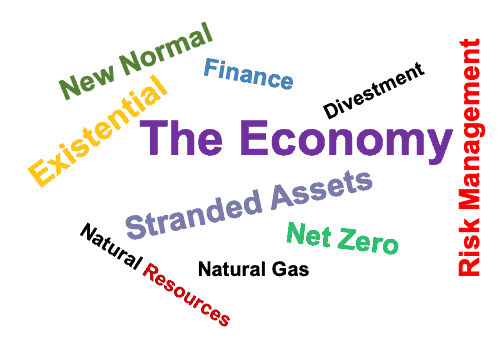There are no magic words.
Words that you can say that will make people suddenly understand and then prevent our rapidly unfolding climate chaos. Some words are better than others, but lots of them are just junk. Of course there is more to the climate crisis than words. But how we communicate is important. Until we train ourselves to recognize, filter out, and use our own simple direct language, we are doomed to climate delay and obfuscation (irony intended).
There are lots to choose from (see a starter list below), but let me give a few banking examples. I would have said, finance examples, except the word finance gives a fancy meaning to those taking your money in the name of safety and risking it in unsafe ventures like pumping oil from the ground which is killing our planet, along with all of us. Their language is quite pernicious (irony also intended).
My new favorite term is stranded assets. We are told that if we leave fossil fuels in the ground we will be stranding assets. Oh, those poor little lost assets. We all know that assets are valuable so why would we want to strand them? The term stranded assets says that oil and gas are valuable and that to strand them is bad. Yet oil, gas, and coal are literally killing us.
The same goes for the term financial risk. The term plays off the ambiguity of risk. Risk is something you are supposed to manage. So when we hear that some entity or government is requiring banks or companies to declare and manage the financial risk of climate, this is f’ing nonsense. It paints a picture that climate collapse can be managed by identifying the risks to our banks. “Relax folks, it’s going to be OK!” Brought to you by the banks that couldn’t manage crap before the 2008 meltdown.
The same goes for the term divestment. Well, don’t we want banks to stop investing in fossil fuels? Of course. But divestment is a shell game. Divest what, divest when, from whom? Don’t get me started on what’s good for the economy!
So when Shitty Bank, Stank of America or Hells Cargo tell you that they are committed to responsible decarbonization and risk managed divestment of companies with stranded assets or some such BS, remember they’ve invested almost 4 TRILLION DOLLARS in fossil fuels since the Paris Agreement.
As climate activists, campaign leaders and environmental communicators we need to change our language.
Our words need to be direct. Say what a thing means in personal terms. Get people to take an action. For example, banks are killing us when they fund fossil fuels. They need to stop. Immediately. Take your money out of Shitty Bank.
Here are three questions to ask yourself in order to stop reinforcing the frames of fossil fuels, financial institutions, and the politicians they have in their pockets.
- If it sounds too lofty, is there a motive behind the word? i.e. The Clear Skies Initiative
- If it is ambiguous, what are they hiding? i.e. Net Zero
- Can we use a more accessible word instead? i.e. Threat against my kids versus Existential threat?
When we use big words, we step in a big steaming pile of ambiguity. Climate activists and progressives are particularly good at this. I used to think that this was because we liked to prove how smart we are. But now I think it’s because we feel so helpless in the face of the climate crisis and those that stand in the way of solutions. Using big words gives us some false measure of control. But it’s not working.
My challenge to you is to start listening to the language being used around climate. Question it. Even your own words. To start us off, I’m asking you is to pick your favorite junk word. Share it in the comment section of this post. Finally, suggest a better word.
And remember that Net Zero is the New Coke of climate. Thanks for what you do. Pass the word.
Hobie,
‘We are all connected. Savor the Earth!’™
L. Hobart Stocking
SkyWaterEarth.com
hobart@skywaterearth.com
651-357-0110
Facebook: @SkyWaterEarthConnected
Twitter: @SkyWaterEarth
PS: Starter words for the junk list:
- New normal
- National security
- The economy
- Net zero
- Natural gas
- Renewable natural gas
- Sustainability
- Natural resources








Leave A Comment